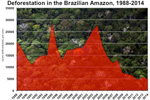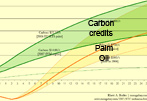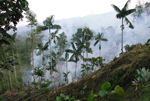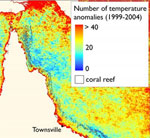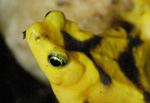FEATURED ARTICLES [Latest news updates]
An interview with Dr. Alex Dehgan:
Adventures in conservation: protecting wildlife in Afghanistan
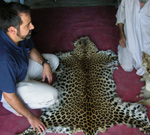
|
|
(08/07/2007) Few people associate Afghanistan with wildlife and it would come as a surprise to many that the war-torn, but fledging democracy is home to snow leopards, Persian leopards, five species of bush dog, Marco Polo Sheep, Asiatic Black Bear, Brown Bears, Striped Hyenas, and numerous bird of prey species. While much of this biodiversity has survived despite years of civil strife, Afghanistan's wildlife faces new pressures from the very people who are charged with rebuilding the country: contractors and the development community are driving the trade in rare and endangered wildlife. This development, coupled with lack of laws regulating resource management and growing instability, complicate efforts to protect the country's wildlife. Working to address these challenges is Dr. Alex Dehgan, Afghanistan Country Director for the Wildlife Conservation Society (WCS). WCS is working to implement the Afghanistan Biodiversity Conservation Program, a three-year project funded by the US Agency for International Development to promote wildlife and resource conservation in the country.
[
Conservation | Featured | Interviews]
Climate change claims a snail
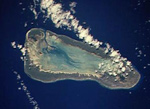
|
|
(08/13/2007) The Aldabra banded snail (Rachistia aldabrae), a rare and poorly known species found only on Aldabra atoll in the Indian Ocean, has apparently gone extinct due to declining rainfall in its niche habitat. While some may question lamenting the loss of a lowly algae-feeding gastropod on some unheard of chain of tropical islands, its unheralded passing is nevertheless important for the simple reason that Rachistia aldabrae may be a pioneer. As climate change increasingly brings local and regional shifts in precipitation and temperature, other species are expected to follow in its path.
[
Extinction and climate change | Extinction | Featured]
Amazon deforestation rate falls to lowest on record
(08/10/2007) Deforestation rates in the Brazilian Amazon for the previous year were the lowest on record, according to preliminary figures released by INPE, Brazil's National Institute of Space Research. Between August 1, 2006 and July 30, 2007, some 3,863 square miles (10,010 square kilometers) of rainforest were cleared, a 28.7 percent drop from 2006 when 5,419 sq ml (14,040 sq km) were lost. Deforestation rates have fallen sharply -- 63.5 percent -- since 2004 when 10,590 sq mi (27,429 sq km) were destroyed. [Update: comment from Amazon researcher]
[
Amazon | Brazil | Happy-upbeat environmental | Deforestation]
Alaska photos
(08/08/2007) In the late July and early August I visited Alaska, traveling by boat through the Inside Passage and Tongass National Forest from Juneau to Sitka and including three days in Glacier Bay National Park. These are my pictures.
[
Photos]
Guidelines to ensure biofuels production won't hurt the environment

|
|
(08/30/2007) After initially supporting biofuels as a renewable source of energy, environmentalists are now increasingly disillusioned by how dominant biofuels are produced. Green groups point to large-scale land conversion for energy crops, higher food prices, and a spate to studies that suggest net emissions from corn ethanol are little better than those from fossil fuels, to caution that biofuels can cause more problems than they address. To address these concerns, a multi-stakeholder initiative led by the Swiss EPFL Energy Center has launched the Roundtable on Sustainable Biofuels. By mid 2008, the group aims to have draft standards to "create a tool that consumers, policy-makers, companies, banks, and other actors can use to ensure that biofuels deliver on their promise of sustainability."
[
Biofuels | Energy | Sustainability]
NGOs should use palm oil to drive conservation

|
|
(08/29/2007) Environmentalists view the expansion of oil palm plantations in southeast Asia as one of the greatest threats to the region's forests and biodiversity. Campaigners say oil palm is driving the conversion of tens of thousands of hectares of peatlands and lowland forest in Indonesia and Malaysia, putting wildlife at risk, increasing the vulnerability of the forests to fires, and triggering large emissions of greenhouse gases. Pressure from these groups have in recent months convinced European policymakers to reconsider sourcing energy crop production to the region.
[
Conservation | Indonesia | Palm Oil]
How private equity can profit from carbon offsets in Indonesia
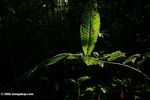
|
|
(08/29/2007) The emerging carbon market for avoided deforestation presents unprecedented opportunities for private equity to make profitable investments that also help protect the environment. Indeed, for the first time, conservation may be associated with positive financial returns. Here's a brief look at how private equity and other investors can capitalize on this opportunity to earn attractive returns while fighting climate change, protecting ecosystem services, and safeguarding endangered species like orangutans.
[
Indonesia | Carbon finance]
Indonesia to push carbon-credits for peatlands conservation

|
|
(08/28/2007) Indonesia plans to seek carbon credits for protecting its carbon-rich peatlands, a forestry official said on Monday. Wahjudi Wardojo, director general for forestry research at Indonesia's Forestry Ministry, told Reuters that industrialized countries will need to provide financial incentives for tropical countries to preserve ecosystems -- like peatlands -- that sequester large amounts of carbon.
[
Carbon finance | Indonesia | Peatlands]
Could peatlands conservation be more profitable than palm oil?
(08/22/2007) Today the Jakarta Post published an editorial written by Sarah Conway and I. In it we argue that conserving Indonesian peatlands for their carbon offset value could be more profitable than clearing the land to produce palm oil. The findings are significant because oil palm cultivation (the plant used to produce palm oil) is an important driver of deforestation in Indonesia, especially on the islands of Borneo and Sumatra, which are the last remaining refuge for orangutans and other rare wildlife. We show that at current European carbon prices (ETS) that peatlands conservation could generate more tax revenue for the Indonesian treasury and higher returns for investors.
[
B.A.D. ideas | Carbon finance | Indonesia | Deforestation | Palm oil]
Biofuels driving destruction of Cerrado savanna in Brazil
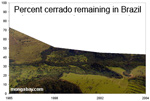
|
|
(08/21/2007) The cerrado, wooded grassland in Brazil that once covered an area half the size of Europe, is fast being transformed into croplands to meet rising demand for soybeans, sugarcane, and cattle. The cerrado is now disappearing more than twice as the rate as the neighboring Amazon rainforest, according to a Brazilian expert on the savanna ecosystem.
[
Amazon | Brazil | Cerrado | Deforestation]
Conservation more effective than biofuels for fighting global warming
(08/16/2007) Conserving forests and grasslands may be a more effective land-use strategy for fighting climate change than growing biofuel crops argues a new paper published in the journal Science. Comparing emissions from various fuel crops versus carbon storage in natural ecosystems, Renton Righelato and Dominick Spracklen write that "forestation of an equivalent area of land would sequester two to nine times more carbon over a 30-year period than the emissions avoided by the use of the biofuel."
[
Biofuels | Deforestation | Energy]
Could a hurricane hit California?

|
|
(08/20/2007) San Diego has been hit by hurricanes in the past and could be affected by such storms in the future according to data from the National Oceanic and Atmospheric Administration (NOAA). While a hurricane in San Diego would likely produce significantly less damage than Hurricane Katrina in New Orleans, it could still exact a high cost to Southern California especially if the region was caught off guard.
[
California | Hurricanes]
Saving the beautiful - and the ugly - creatures of the world
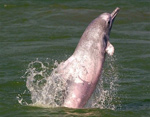
|
|
(08/31/2007) Allow me to wax poetic about the world's newest wildlife organization, EDGE. I must admit I'm a little in love. This singular organization was founded in January as a part of the London Zoological Society. Its basic tenants remain similar to other endangered species programs: survey populations, set up conservation programs, work with local governments and communities to ensure protection. However, what is unique about EDGE is not their approach to saving species, but rather the species they choose to focus their efforts on.
[
Extinction | Conservation | Happy-Upbeat Environmental]
Peru's deforestation rate surged in 2005
(08/31/2007) Peru's deforestation rates surged in 2005, according to new analysis published in the journal Science. Using high resolution satellite data from the Peruvian Amazon, a team led by Stanford University scientists found a marked increase in forest disturbance and clearance for the 2004-2005 year. Forest degradation for the year -- including 1,174 square kilometers of forest cleared and 1,070 disturbed -- was about 175 percent of the mean for the six-year period examined.
[
Amazon | Deforestation | Peru]
Environmental, safety concerns mount over China's Three Gorges Dam
(08/29/2007) Environmental problems are worse than anticipated at China's massive Three Gorges Dam, reports the The Wall Street Journal. A year after its completion, there are rising concerns of pollution, landslides, and flooding.
[
China | Dams | Pollution]
"Extinct" baiji river dolphin spotted alive in China

|
|
(08/29/2007) An "extinct" baiji has been spotted alive in the Yangtze River, reports Chinese state media. The freshwater dolphin, declared extinct just days ago by a leading Chinese scientist, was seen at Xuba ferry in Tongling (Anhui Province) on August 19 and filmed it with a digital camera, said Dr. Wang Kexiong, a researcher at the Institute of Hydrobiology of the Chinese Academy of Sciences who reviewed the video footage.
[
Cetaceans | China | Endangered species | Wildlife]
Ozone Hole makes Early Appearance in 2007
(08/28/2007) The Antarctic ozone hole was discovered in 1985 by British scientists Joseph Farman, Brian Gardiner, and Jonathan Shanklin of the British Antarctic Survey. Though called a hole, it is rather a location in the ozone shield -- a layer that keeps ultra-violet rays from affecting us directly -- that is substantially lacking in ozone concentration.
[
Antarctica | Ozone layer]
New poison frog species discovered in Colombia

|
|
(08/28/2007) Scientists have discovered a previously unknown species of poison frog in a remote mountainous region in Colombia. The tiny frog has been dubbed the "golden frog of Supata" and lives only in a 20 hectare area in Colombia's Cundinamarca region. The scientists who made the discovery say very little is known about the species other than it belongs to a group of highly venomous "dart fogs."
[
Species discovery | Amphibians | Colombia]
Scientists meet in Hungary to discuss saving dying frogs

|
|
(08/28/2007) Scientists are meeting this week in Budapest, Hungary to discuss last-ditch efforts to save the world's most threatened frogs from extinction. Amphibian Ark, as the project is named, is seeking to house 500 individual frogs from each of 500 species in biosecure facilities to protect them from a devastating disease that is fast killing wild amphibians around the world.
[
Amphibian crisis | Conservation]
Greenhouse gases made 2006 2nd-warmest year on record for U.S.
(08/28/2007) Greenhouse gases likely accounted for over half of the widespread warmth across the continental United States in 2006, report scientists writing in the September 5th issue of the journal Geophysical Research Letters. The research team, led by Paul Hoerling at the National Oceanic and Atmospheric Administration (NOAA) Earth System Research Lab in Boulder, Colorado, found that el Nino played little role in last year’s average temperature, which was the second highest since recordkeeping began in 1895, but that other natural factors likely contributed to the near-record warmth.
[
Climate change | United States]
U.S. grazing lands at risk due to rising CO2 levels
(08/27/2007) Rising carbon dioxide levels could cause significant changes to open grazing lands and rangelands around the world, reports a study published in the journal Proceedings of the National Academy of Sciences.
[
United States | Impact of climate change]
Global warming causes increase in tropical rainfall
(08/27/2007) Climate change appears to be resulting in higher levels of rainfall in the tropics, reports NASA.
[
Earth science | Impact of climate change]
Wall Street looks at energy efficiency to boost profits
(08/27/2007) Today the Wall Street Journal featured a special section on energy efficiency. The paper reports that business is increasingly looking at reducing energy use as a way to improve the bottom line.
[
Energy | Energy efficiency]
Obesity rates increase nationwide in 2006
(08/27/2007) 31 states saw a rise in obesity rates last year, reports a new study by the Trust for America's Health, a research group that focuses on disease prevention.
[
United States]
U.S. to spend $27M on possibly extinct bird
(08/26/2007) The U.S. government plans to spend $27 million on the recovery efforts for a bird species that may already be extinct, reports the Associated Press.
[
Extinction | Birds | Endangered species]
With Corn ethanol more costly than oil, is Jatropha a better biofuel?
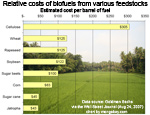
|
|
(08/24/2007) Jatropha may be a more economic biofuel than corn-based ethanol, reported the The Wall Street Journal on Friday, citing research from Goldman Sachs. Analysis of the bioenergy market suggests that jatropha, which can be grown in variable conditions with little water or fertilizer, could be used to produce a barrel of fuel for around $43, less than the cost of sugar cane-based ethanol ($45 per barrel) or corn-based ethanol ($83 per barrel) currently favored in the United States. Further, because jatropha isn't edible and grows on land unsuitable for foods crops, its expansion doesn't compete with traditional food production.
[
Biofuels | Ethanol]
Iceland halts whaling until demand picks up
(08/24/2007) With stagnant demand for whale meat nearly a year after ending its ban on commercial whaling, Iceland said it would not issue new whale-hunting quotas until it gets an export license from Japan, reports Reuters.
[
Whales]
Iron boosts carbon sequestration by the ocean

|
|
(08/23/2007) Wind-blown iron contributes significantly to the biological productivity of the Southern Ocean near Antarctica, researchers report in this week's issue of the journal Science. The results suggest that wind-blown dust -- one of five sources of bioavailable iron to surface waters of the Southern Ocean -- may have important climate implications, but the author caution that the research "does not bring any new insight into the efficacy of artificial iron fertilization in sequestering carbon dioxide."
[
Oceans | Carbon sequestration]
Mountain gorilla born in Congo

|
|
(08/23/2007) Conservationists announced the birth of a critically endangered mountain gorilla in the Democratic Republic of Congo's Virunga National Park. The newborn marked a positive development for the embattled apes in the park -- nine out of its 100 gorillas have been killed this year by poachers, including five last month. WildlifeDirect called the birth "a key step toward the survival of this critically endangered species."
[
Conservation | Gorillas | Happy-upbeat environmental | Wildlife]
Animal trafficking at Miami International airport

|
|
(08/23/2007) Authorities estimate that the wildlife trade in the United States is a billion-dollar business and the potential for illegal profits pushes it into the top three smuggling crimes, right alongside drugs and guns. Resident Agent in Charge Eddie McKissick guesses that, pound-for-pound, illicit profits in wildlife probably exceed those of cocaine.
[
Pet trade | Wildlife trafficking]
Groups demand AES withdraw from Panama dam projects

|
|
(08/23/2007) More than 50 green groups demanded Thursday that AES Corporation withdraw from three controversial hydroelectric projects that are threatening La Amistad International Park in Panama. Environmentalists say the dams threaten to displace wildlife and local communities -- the Naso and Ngobe people -- in the World Heritage site.
[
Dams | Panama]
U.S. military attacks illegal wildlife trade in Afghanistan
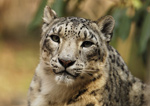
|
|
(08/22/2007) The U.S. military has teamed with the Bronx Zoo-based Wildlife Conservation Society (WCS) to attack the illegal wildlife trade in Afghanistan, according to a statement from the Department of Defense. WCS is training military personal to recognize endangered wildlife -- including snow leopards and Marco Polo sheep -- that is trafficked illegally in Afghanistan's markets. The efforts are part of a wider campaign against wildlife trade in Afghanistan, one that includes advertisements, posters in airports, educational materials for schools, and editorials and newspaper articles for the Afghan and international development community.
[
Conservation | Wildlife trafficking]
U.S. firms driving pollution in China

|
|
(08/22/2007) U.S. firms are helping drive environmental degradation in China, putting the health of millions of Chinese at risk, reports The Wall Street Journal. The paper says that by demanding ever lower products for goods, manufacturers are forced to reduced environmental safeguards in order to compete.
[
China | China's environmental problems | Pollution]
China to miss pollution goals for 2007

|
|
(08/22/2007) China has managed to cut emissions of sulphur dioxide, an acid-rain causing pollutant, during the first half of 2007 but is likely to miss reduction targets for the year, reports the State Environmental Protection Administration (SEPA).
[
China | China's environmental problems | Pollution]
Land reform agency sanctions logging in Amazon rainforest park

|
|
(08/21/2007) Under the guise of a sustainable development scheme, a Brazilian land agency has granted large tracts of Amazon rainforest to colonists who quickly resold the forest to loggers, alleges a new report from Greenpeace. Some of the concessions were in the Amazon National Park, a national park.
[
Amazon | Brazil | Deforestation]
Crop domestication originated in compost piles
(08/19/2007) New research lends support to the theory that backyard gardens and refuse heaps played an important role in early crop domestication. Writing in the August 17th issue of Proceedings of the Natural Academy of Sciences, an international team of researchers provide empirical evidence of spontaneous hybridization for a legume tree (Leucaena) in Mexico based on archaeological, ethnobotanical, geographical, and genetic data.
[
Agriculture | Anthropology]
'New continent' and species discovered in Atlantic study
(08/18/2007) The Census of Marine Life reports the discovery of previously unknown marine species during a five-week scientific expedition in the North Atlantic.
[
Oceans]
Arctic sea ice shrinks to record low in 2007
(08/17/2007) Arctic sea ice has shrunk to a record low according the Japan Aerospace Exploration agency.
[
Greenland-Arctic | Sea ice]
Sony launches consumer electronics recycling program
(08/17/2007) Sony has launched a recycling program for consumer electronics.
[
Green business]
NASA admits to error in global warming data
(08/17/2007) NASA has admitted to a data error that skewed temperature records since 2000.
[
Remote sensing]
Earthquakes can break speed limit
(08/17/2007) Earthquakes can move faster than previously thought with rupture rates well exceeding the conventional 3 kilometers per second, reports Oxford University professor Shamita Das writing in the journal Science. The finding suggests that earthquakes in the world's largest quake zones may be capable of more destruction than earlier projections.
[
Earthquakes]
Group seeks salvation for 189 endangered bird species
(08/16/2007) BirdLife International has launched an appeal to save 189 endangered bird species over the next 5 years. The U.K.-based conservation group is seeking to raise tens of millions of dollars through its Species Champions initiative, by finding "Species Champions" among individuals, private foundations, and companies who will fund the work of identified "Species Guardians" for each bird.
[
Birds]
Climate change reducing Lake Tahoe's water clarity
(08/16/2007) Lake Tahoe in Northern California is losing is characteristic water clarity due to pollution and climate change, reports a new study by the University of California at Davis.
[
California]
Clearing rainforest for cattle pasture drives surge in vampires
(08/15/2007) A new study confirms that vampire bats are thriving due to the clearing of rainforest for cattle pasture in Costa Rica. Instead of having to seek out scarce wildlife in the forest, vampire bats now prey on cattle kept in high densities on ranches.
[
Costa Rica | Deforestation| Mammals]
As wealthy get dengue fever, drug companies more likely to act
(08/15/2007) As dengue fever increasingly becomes a disease of the affluent -- especially in Asia -- drug companies are showing more interest in developing treatment, reports a new article published in the journal Nature.
[
Health]
Legless lizard retracts eyes to avoid retaliatory prey bites
(08/15/2007) For creatures without legs, snakes are remarkable predators. Pythons can capture and eat animals well over twice their size, while a mere drop of venom injected by an Australian death adder can kill a person. Scientists believe the main purpose for these adaptations is to help snakes avoid injury when pursuing and eating prey. However, snakes are not the only legless reptiles -- there are more than a dozen species of legless lizard distributed around the world. A new paper examines how these reptiles subdue their prey without venom or constriction.
[
Animal behavior]
2004 Indian Ocean tsunami waves hit Florida, Maine
(08/14/2007) Waves from the devastating December 2004 tsunami were recorded along the Atlantic coast of North America, reports a new study published in Geophysical Research Letters.
[
Tsunami]
Geoengineering cure for global warming could cause problems
(08/14/2007) Proposed geoengineering schemes to reduce global warming may do more harm than good, warns a new study published in Geophysical Research Letters.
[
Global warming mitigation]
Low deforestation countries to see least benefit from carbon trading
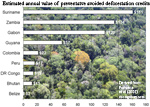
|
|
(08/13/2007) Countries that have done the best job protecting their tropical forests stand to gain the least from proposed incentives to combat global warming through carbon offsets, warns a new study published in Tuesday in the journal Public Library of Science Biology (PLoS). The authors say that "high forest cover with low rates of deforestation" (HFLD) nations "could become the most vulnerable targets for deforestation if the Kyoto Protocol and upcoming negotiations on carbon trading fail to include intact standing forest."
[
Carbon finance | Deforestation]
New flycatcher bird species discovered in Peru
(08/13/2007) Scientists have discovered a previously unknown species of bird in dense bamboo thickets in the Peruvian Amazon.
[
Birds | Species discovery]
Failing water supply destroyed lost city of Angkor Wat
(08/13/2007) The ancient city of Angkor in Cambodia was larger in extent than previously thought and fed by a single water system, according to a new map published by an international team of researchers. The study, published in the early online edition of the journal Proceedings of the Natural Academy of Sciences, suggests that the urban settlement sustained an elaborate water management network extending over more than 1,0000 square kilometers. The research supports the theory that the "overexploitation of the landscape" eventually led to the collapse of Angkor.
[
Ancient civilizations | Cambodia]
Squirrels communicate with rattlesnakes using heated tail
(08/13/2007) Ground squirrels heat their tails to defend their young against predatory rattlesnakes, reports a study published in the early online edition of Proceedings of the Natural Academy of Sciences (PNAS). While scientists have long known that ground squirrels wave their tails at rattlesnakes, it was unclear why they did so more vigorously at night. Now, a paper led by Aaron S. Rundus of the University of California at Davis shows that squirrels are specifically signaling rattlesnakes, which can sense infrared radiation.
[
Extinction and climate change | Extinction | Featured]
Global warming to stunt growth of rainforest trees
(08/12/2007) Global warming could reduce the growth rates of rainforest trees by 50 percent, reported research presented last week at the annual meeting of the Ecological Society of America in San Jose, California by Ken Feeley of Harvard University's Arnold Arboretum in Boston.
[
Carbon sequestration | Rainforests]
Controversy over flawed NASA climate data changes little
(08/11/2007) NASA corrected an error on its U.S. air temperature data after a blogger, Steve McIntyre of Climate Audit, discovered a discrepancy for the years 2000-2006. The revised figures show that 1934, not 1998, was America's hottest year on record. The change has little affect on global temperature records and the average temperatures for 2001-2006 (at 0.66 C) is still warmer than 1930-1934 (0.63 C) in the United States. Nevertheless climate change skeptics seized the opportunity to claim that the data is further "proof" the global warming is not occurring.
[
Climate Change | Environmental politics]
Temperate forests not a fix for global warming
(08/10/2007) Carbon sequestration projects in temperate regions -- already facing doubts by scientists -- were dealt another blow by Duke University-led research that found pine tree stands grown under elevated carbon dioxide conditions only store significant amounts of carbon when they receive sufficient amounts of water and nutrients.
[
Forests | Carbon sequestration]
Apple comes up a bit short on eco-credentials of new iMac
(08/10/2007) While Apple has touted the environmental attributes of its newest iMac, critics say the new computer failed to live up to the company's goals for the use of mercury, reports the San Jose Mercury.
[
Green business | Technology]
Floating sea ice shrinks in the Arctic
(08/10/2007) By one estimate, the extent of floating sea ice in the Arctic has shrunk more than in any summer ever recorded, reports the New York Times.
[
Greenland-Arctic | Sea ice]
U.N. sends team to investigate gorilla killings

|
|
(08/10/2007) The U.N. said it will send a team of experts to probe the killings of critically endangered mountain gorillas in the Democratic Republic of the Congo (DRC). Four gorillas were shot "execution-style" last month, while three others have been killed so far this year. Rangers believe illegal charcoal harvesters from Goma are to blame.
[
Gorillas | Congo]
Papua seeks funds for fighting global warming through forest conservation
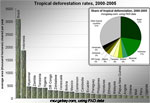
|
|
(08/10/2007) In an article published today in The Wall Street Journal, Tom Wright profiles the nascent "avoided deforestation" carbon offset market in Indonesia's Papua province. Barnabas Suebu, governor of the province which makes up nearly half the island of New Guinea, has teamed with an Australian millionaire, Dorjee Sun, to develop a carbon offset plan that would see companies in developing countries pay for forest preservation in order to earn carbon credits. Compliance would be monitored via satellite.
[
Carbon finance | Indonesia]
New shrew species, orchid discovered in the Philippines
(08/10/2007) An unknown shrew species has been discovered on Palawan, a large island in the Philippines, by a Conservation International-led expedition.
[
Philippines | Species discovery]
Organic, shade grown cacao good for birds
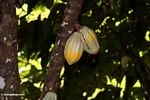
|
|
(08/10/2007) Bird diversity in cacao farms in Panama is considerably higher when crops are grown in the shade of canopy trees, reports a study published earlier this year in Biodiversity Conservation. The research has implications for biodiversity conservation and the sustainability of cacao plantations.
[
Agriculture | Biodiversity | Panama | Sustainability]
Lowland rainforest less diverse than previously thought
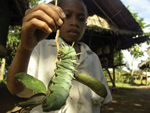
|
|
(08/10/2007) While rainforests are the world's libraries of biodiversity, species richness may be more evenly distributed in some forests than in others, reports an extensive new study by an international team of entomologists and botanists. The work, published in the current issue of the journal Nature, has important implications for forest management and conservation strategies.
[
Rainforests | Biodiversity | Papua New Guinea | New Guinea]
Experts: parks effectively protect rainforest in Peru

|
|
(08/09/2007) High-resolution satellite monitoring of the Amazon rainforest in Peru shows that land-use and conservation policies have had a measurable impact on deforestation rates. The research is published in the August 9, 2007, on-line edition of Science Express. Analyzing seven years of high-resolution satellite data covering 79 percent of the Peruvian Amazon, scientists at the Carnegie Institution's Department of Global Ecology found that only 1 to 2 percent of forest disturbance occurs in protected areas, which are 18 times more effective at reducing deforestation than unprotected areas.
[
Peru | Happy-upbeat environmental | Deforestation | Protected areas]
Global warming will slow, then accelerate reports ground-breaking model

|
|
(08/09/2007) Global warming will slow during the next few years but then accelerate with at least half of the years after 2009 warmer than 1998, the warmest year on record, reports a new study that is the first to incorporate information about the actual state of the ocean and the atmosphere, rather than the approximate ones most models use. The research, published by a team of scientists from the Hadley Center in the United Kingdom, appears in the current issue of the journal Science.
[
Climate change | Climate modeling]
Industrial pollution has caused Arctic warming since 1880s
(08/09/2007) Industrial soot emissions have been warming the Arctic since at the least the 1880s, reports a new study that examined "black carbon" levels in the Greenland ice sheet over the past 215 years. The research is published in current issue of the journal Science.
[
Pollution | Greenland-Arctic]
Wild ferrets, America's most endangered mammal, recover
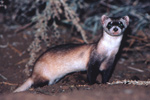
|
|
(08/09/2007) Black-footed ferrets (Mustela nigripes), North America's most endangered mammal species, are recovering in their native Wyoming, reports a study published in the current issue of the journal Science. The wild population of the carnivores was down to seven when they were captured for a captive breeding program in 1981. More than 220 captive-born ferrets were reintroduced into their natural habitat between 1991 and 1994, but disease reduced the population to five by 1997. Nevertheless, continued efforts are paying off and today there are more than 223 ferrets in the wild.
[
Peru | Deforestation | Protected areas]
New Park in Argentina Protects 500,000 Penguins

|
|
(08/09/2007) The government of Argentina will create a new marine park along the coast of Patagonia, reports the Bronx Zoo-based Wildlife Conservation Society. Located in Golfo San Jorge, the park will protect more than half a million penguins and other rare seabirds. The announcement was made Thursday by President Nestor Kirchner of Argentina, the Governor of the Province of Chubut and by Argentina's National Park Service.
[
Penguins | Happy-upbeat environmental | Protected areas]
Primatologist freed but questions remain for Brazil

|
|
(08/08/2007) While primatologist Dr. Marc van Roosmalen has been freed from prison pending appeal, prominent scientists had stinging criticism for the Brazilian government over its increasingly "hostile" treatment of researchers. Before Roosmalen was released Tuesday, some scientists even threatened "civil disobedience," according to a report in the journal Nature.
[
Brazil]
Extinction of the Yangtze river dolphin is confirmed

|
|
(08/08/2007) After an extensive six-week search scientists have confirmed the probable extinction of the baiji or Yangtze river dolphin. The freshwater dolphin's extinction had been reported late last year Foreign and Chinese government scientists, surveyed the entire 1,669km stretch of the Yangtze river from the Three Gorges Dam to Shanghai, an area which has been the natural habitat for river dolphins. The team used two boats to search the river four times during the six-week survey, using hydrophones listen for their calls and spotters to look for the dolphins. None were found.
[
China | Extinction]
Rare pygmy elephants endangered by logging in Borneo
(08/08/2007) Pygmy elephants are increasingly threatened by logging and forest conversion for agriculture in their native Borneo, reports a new satellite tracking study by WWF.
[
Borneo | Elephants]
100 years ago: oil shortages spur need for alternative fuels
(08/08/2007) Today's issue of the journal Nature took an look back at a dire warning that while issued 100 years ago, could have just as well been issued last week.
[
Biofuels | Oil]
Coral cover declines by 50% since 1980
(08/08/2007) Coral reefs in the Pacific Ocean are dying faster than previously thought due to costal development, climate change, and disease, reports a study published Wednesday in the online journal PLoS One. Nearly 600 square miles of reef have disappeared per year since the late 1960s, a rate twice that of tropical rainforest loss. Compiling and analyzing a database of 6,000 quantitative surveys performed between 1968 and 2004 of more than 2,600 Indo-Pacific coral reefs, John Bruno and Elizabeth Selig of the University of North Carolina at Chapel Hill (UNC) found that reefs are disappearing at a rate of one percent per year. Coral cover fell from 40 percent in the early 1980s to around 20 percent by 2003.
[
Coral Reefs and Climate Change | Oceans]
Ethnobotanist honored for contributions to wilderness medicine
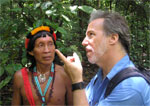
|
|
(08/08/2007) Renowned ethnobotanist and conservationist Dr. Mark Plotkin of the Amazon Conservation Team was honored Wednesday with the 2007 Paul S. Auerbach Award, a distinction awarded by the Wilderness Medical Society (WMS). In selecting Plotkin, WMS recognized his "sustained significant service to wilderness medicine and scientific achievement in the field."
[
Amazon | Ethnobotany | Environmental heroes]
New species discovered in "lost" African forest
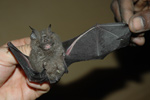
|
|
(08/07/2007) Scientists have discovered several unknown species during an expedition to a forest that has been off-limits to researcher for nearly 50 years due to civil strife. Exploring Misotshi-Kabogo Forest and nearby Marunga Massif just west of Lake Tanganyika in the Democratic Republic of Congo, a team led by the Wildlife Conservation Society have found six species new to science: a bat, a rodent, two shrews, and two frogs.
[
Congo | Species discovery]
U.S. court blocks sonar testing to protect whales

|
|
(08/07/2007) A U.S. federal court blocked the Navy from using a type of sonar that environmentalists say pose a threat to whales off the coast of California. The judge noted that the Navy's own analyses concluded that the Southern California exercises "will cause widespread harm to nearly thirty species of marine mammals, including five species of endangered whales, and may cause permanent injury and death" and characterized the Navy's proposed mitigation measures as "woefully inadequate and ineffectual."
[
California | Environmental law | Whales]
Scientists demand Brazil release renowned primatologist [update!]
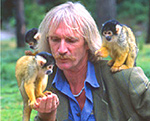
|
|
(08/06/2007) A prominent group of scientists have issued a petition to free world-renowned primatologist Marc van Roosmalen from Brazilian prison after he was charged with illegally keeping monkeys without a permit and other crimes. The scientists have called his imprisonment an "attack on the practice and profession of biological science in Brazil," noting that "van Roosmalen's situation is indicative of a trend of governmental repression of scientists in Brazil." [
Amazon | Brazil]
2007 hurricane season downgraded, questions over climate role remain

|
|
(08/06/2007) Hurricane researcher William Gray from Colorado State University cut his 2007 hurricane season outlook, saying there will likely be fewer storms than previously projected due to weak La Nina conditions and more atmospheric dust from Africa. Gray and his colleague Philip J. Klotzbach said they expected 15 named storms and eight hurricanes -- four of which would be intense -- in the Atlantic basin during the 2007 hurricane season.
[
Hurricanes]
Frog killing diseases worse than thought in California
(08/06/2007) The deadly fungal disease that is killing amphibians worldwide can likely be spread by sexual reproduction reports a new study published in the early online edition of the journal Proceedings of the National Academy of Sciences. The findings suggest that protecting frogs and other amphibians from the pathogen will be more complicated than previously believed.
[
Amphibian crisis | Extinction]
Overfishing takes toll on Bluefin tuna
(08/06/2007) Overfishing has caused dramatic shifts in bluefin tuna populations that have pushed the species closer towards extinction in some areas, reports a series of studies by the Census of Marine Life (CoML) and other researchers.
[
Oceans | Overfishing]
Carbon credits could be big earner for Indonesia
(08/06/2007) While I was traveling, an editorial I wrote with Gabriel Thoumi appeared in the Jakarta Post. We argued that carbon credits could generate significant income opportunities for Indonesian business and tax revenue for the Indonesian government.
[
Indonesia]



